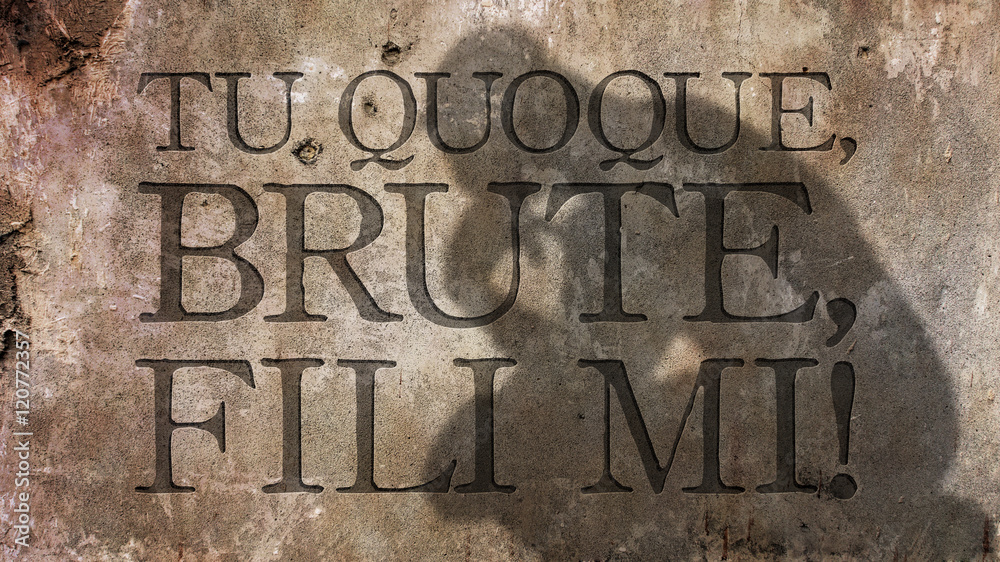
Tu quoque fili mei? Desmotivaciones
Regarding the particular phrase you cite ("Tu quoque, Brutus, mi fili?"), I suspect that it is misquoted, since it returns pretty much 0 results in a web search and it's not good Latin. As you note, the vocative of "Brutus" is "Brute." "Fili mi," however, actually is the correct vocative. Modified in this way, the phrase "Tu quoque, Brute, mi.

Tu quoque, Brute, fili mi Mug by Laura Nadeszhda Mugs, Halloween mug, Glassware
Tu quoque, Brute, fili mi? (Idiom, Latin) — 24 translations (Arabic, Czech, Danish, Dutch, English, Finnish, French, German, Greek (Ancient), Hungarian, Indonesian.

"Tu quoque, Brute, fili mi " Zipper Pouch for Sale by lauranadeszhda Redbubble
Tu quoque mi fili ou bien Tu quoque fili ou encore Tu quoque fili mi (en français : « Toi aussi, mon fils ! ») est une célèbre locution latine, que la tradition attribue à Jules César : ce dernier l'aurait adressée, en guise de dernier souffle, à Brutus.. », « Brute » étant la forme de vocatif de Brutus,.

"Tu quoque, Brute, fili mi " Posters by Laura Nadeszhda Redbubble
The tag Et tu, Brute? is first attested in Shakespeare's The True Tragedy of Richard Duke of York (1595. Charles François Lhomond, in his De uiris illustribus, Julius Caesar renders the Greek as tu quoque, fili mi! The authors of Asterix also seem to be sensitive to Latin idiom, presumably because of Lhomond's continuing influence in.

"Tu quoque, Brute, fili mi " Tshirt by lauranadeszhda Redbubble
French (lower Normandy) Jul 11, 2006. #2. Hello. Not really a Latin specialist but personally I had always said: "Tu quoque, mi filii". but according to my grammar book, it's: "Tu quoque, mi fili". => Les noms en -ius ont un vocatif singulier contracté en -i. But apparently, according to this site, it's not what Caesar would have said anyway.

Haldeyde's graffiti Tu quoque, Brute, fili mi!
Tu quoque, Brute, fili mi! (Persino tu, Bruto, figlio mio) è un'espressione latina attribuita a Giulio Cesare. Si narra che queste siano state le ultime parole da lui pronunciate in punto di morte (Idi di marzo del 44 a.C.), mentre veniva trafitto dai congiurati, riconoscendo fra i suoi assassini il volto di Marco Giunio Bruto

"Tu quoque, Brute, fili mi " iPhone Case & Cover by lauranadeszhda Redbubble
The Shakespearean macaronic line "Et Tu Brutè?" in the First Folio from 1623 This 1888 painting by William Holmes Sullivan is named Et tu Brute and is located in the Royal Shakespeare Theatre. Photograph of the Mercury Theatre production of Caesar, the scene in which Julius Caesar (Joseph Holland, center) addresses the conspirators including Brutus (Orson Welles, left).

Tu quoque Brute fili mi! Nahuel Martinez Flickr
Tu quoque, fili mei? ( AFI /Tu ˈkʷɔ.kʷɛ ˈfʲilʲi mi/) frase latina dicha por el general y cónsul romano Julio César en el idus de marzo (15 de marzo) del año 44 a. C. La traducción sería: «¿Tú también, hijo mío?». Esta frase se usa hoy en día a modo de expresión cuando uno recibe una traición de alguien que no se esperaba.

"Tu quoque, Brute, fili mi " Sticker by lauranadeszhda Redbubble
The real phrase is "tu quoque, Brute, fili mi!", and means "You too?" When we realize to have been betrayed by a person in which we trusted, like Julius Caesar when seeing his son among their killers. Explained by annabellanna on Tue, 16/10/2018 - 13:52. Explained by annabellanna.

Quoque tu, Brutto... Fili mi! copertinakleos 16marzo2013 Copertina
While "Et tu, Brute?" is the best known Latin version of the phrase in the English-speaking world due to Shakespeare, another well-known version in continental Europe is "Tu quoque, fili mi?" (or "mi fili?" with the same meaning), which is a more direct translation from the Greek. Likelihood L'assassinio di Cesare by William Rainey

Quoque tu, Brute... YouTube
'Tu quoque Brute fili mihi!' ('You too, Brutus, my child?'), the last words of Julius Caesar, well summarize the unexpected role of stroma cells, immune system and extrinsic pathway in promoting breast cancer progression. As we are rapidly entering the era of precision cancer medicine using a genomic and biomarker-integrated approach to.

Pin em Misc. Entertainment
LEMMI CORRELATI. tu quoque, Brute, fili mi? (lat. «anche tu, Bruto, figlio mio?»). - Parole che, secondo la tradizione, Cesare prima di morire avrebbe rivolto a Marco Bruto riconoscendolo tra i suoi uccisori. Si ripetono talora (spesso nella forma abbreviata tu quoque? ), in tono di amaro rimprovero o, anche, di scherz. e finta sorpresa.

"Tu quoque, Brute, fili mi " Poster by lauranadeszhda Redbubble
La célèbre citation latine Tu quoque, mi fili ! est elle-même truquée puisque, selon Suétone (Vie de César, 82, 3), les mots prononcés par César reconnaissant Brutus parmi les conjurés auraient été dits en grec. Déformant une rumeur rapportée par Plutarque (Vie de Brutus, 5, 2), la tradition française a en effet considéré comme.

Tu quoque, Brute, fili mi? Anche tu Bruto, figlio mio? STORIE ROMANE
A variant translation, especially popular in French, of Ancient Greek καὶ σύ, τέκνον (kaì sú, téknon). The Greek is attributed to Caesar as his last words, but on no supporting evidence. Consists of tū ("thou, you (sg.)"), quoque ("also, too"), and the vocatives of meus ("my") and fīlius ("son") .

Tu quoque Brute fili mi significato e il perché della frase Studia Rapido
Era il 15 marzo del 44 a.C. quando Cesare pronunciò, prima di cadere, le sue ultime più famose parole: " Tu quoque, Brute, fili mi". Alle idi di marzo, in largo Argentina, dove duemila anni fa si trovava la Curia di Pompeo, sede provvisoria del Senato distrutto dopo un incendio, accadde uno degli omicidi più efferati della storia.

Foto de Tu quoque, Brute, fili mi. A Latin phrase that means And you, Brutus or You too, Brutus
Et tu, Brute? Said to be the same as: Kaì sú téknon, Last words of Julius Caesar: Authority file Q98431902. Reasonator; Scholia; Wikidocumentaries; PetScan; statistics; WikiMap; Locator tool; KML file; Search depicted; Media in category "Tu quoque mi fili" This category contains only the following file. European School - tu quoque mi fili.
- Quanti Abitanti Ha Castellammare Di Stabia
- Fiat 55 L Cingolato In Vendita
- Ristorante Pesce Torre A Mare
- Tomb Raider Lara Croft And The Temple Of Osiris
- Tesina Sul Cinema Terza Media Pdf
- Pranzo Del Purgatorio Gradoli 2024
- South Beach Miami Lincoln Road
- La Compagnia Del Cigno 2
- Tiziana Giardoni Figlia Di Baudo
- Foto La Societa Della Neve